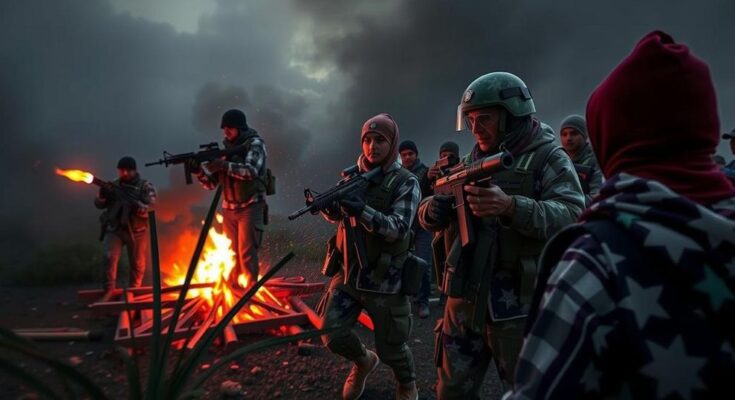Amid the weakening support for President Bashar al-Assad by allies Iran, Hezbollah, and Russia, Syrian rebels have launched a significant offensive, capturing key territories including Aleppo. This shift underscores vulnerabilities within al-Assad’s regime, with geopolitical distractions faced by his allies contributing to the rebels’ successful advance.
The Syrian civil war, which commenced over a decade ago, has witnessed a significant shift in momentum as opposition forces have capitalized on the perceived weakening of President Bashar al-Assad’s allies. Historical supporters such as Iran, Hezbollah, and Russia are currently preoccupied with their respective challenges, enabling rebels to execute coordinated offensive operations. Recently, the rebels have claimed substantial victories, notably within Aleppo, once a stronghold of the Assad regime, indicating a possible turning point in the long-standing conflict.
For many years, President al-Assad’s government relied heavily on military aid and strategic support from Iran, Hezbollah, and Russia to suppress uprising activities. However, recent developments reveal a critical decline in this support. Concurrent battles involving Israel against Hezbollah and Iranian forces have distracted these allies, while Russia’s involvement has shifted primarily toward the Ukraine conflict, diminishing their effective participation in Syria.
Critically, Hezbollah has faced increased casualties and losses in confrontations with Israel, undermining its capacity to assist al-Assad effectively. This has left the Syrian government increasingly vulnerable, exemplified by the rapid territorial gains made by opposition factions that have restructured the front lines after years of stagnant conflict.
As geopolitical dynamics evolve, it seems that rebels from Hayat Tahrir al-Sham, a former Al Qaeda affiliate, strategically timed their assault during this moment of disarray. Factors contributing to this timing include diminishing resource allocation by Iran and a potential shift in the Turkish stance toward the conflict, which had previously restrained direct action against al-Assad. The outbreak of hostilities has compelled al-Assad’s forces to reassess their deployment and engagement strategies in a rapidly changing conflict landscape.
The situation necessitates reevaluating not only support systems for the Syrian government but also the domestic implications of continuing the reign of Bashar al-Assad, who has so far failed to initiate any meaningful socio-economic improvements within government-controlled territories. The ongoing civil unrest and lack of public support signal a crucial juncture requiring decisive action from international stakeholders.
Thus, the rebellion’s recent successes highlight both the strategic implications of external conflicts surrounding Syria and the inherent vulnerabilities of al-Assad’s regime amidst shifting alliances and regional dynamics. Observers should closely monitor how these developments will reshape the context of the civil war.
The Syrian civil war began as peaceful protests against President Bashar al-Assad’s regime in 2011, which soon escalated into a brutal conflict characterized by varying factions vying for power. Over the years, foreign powers have become embroiled in the conflict, significantly influencing its trajectory. Iran, Hezbollah, and Russia have historically provided military and strategic support to al-Assad, allowing him to maintain control over much of Syria. However, their involvement has waned due to external conflicts, notably Israel’s ongoing hostilities with Hezbollah and the ramifications of Russia’s military commitments in Ukraine. The current fragility of al-Assad’s coalition partners poses a significant challenge for his government, stirring renewed efforts from opposition forces, and suggesting a transformative phase in the ongoing civil war.
In conclusion, the recent strategic offensive by Syrian rebels reflects a critical opportunity arising from the diminished support for President Bashar al-Assad from key allies such as Iran, Hezbollah, and Russia. The shifting geopolitical landscape, coupled with al-Assad’s inability to strengthen domestic support, presents significant challenges for his regime. The advancements made by opposition forces, notably their substantial gains in Aleppo, indicate a potential pivotal moment in the Syrian conflict, emphasizing the need for continuous monitoring and analysis of evolving dynamics.
Original Source: www.nytimes.com




